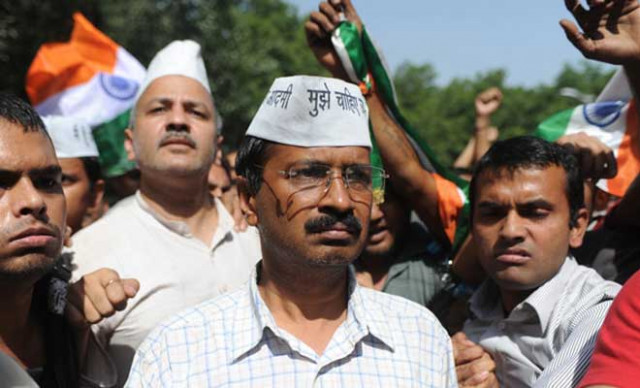It is also my first night of reporting for the Press Trust of India at the venue.
It seems that the sky is also being economical in the use of light tonight for it has extinguished all its candles, that is, stars. In these dark yet enlightening hours, sleep hangs heavy on my eyelids. Yet, I do not wish to sleep for I want to enjoy every moment of my stay here. Verily, nobody will sleep here tonight, not even that young reporter of NDTV who, at some distance, is rehearsing an interview that she is going to conduct anon. She pauses for a second and looks at me with a faint smile on her visage. These are indeed exciting times for young journalists like us, for we are witnessing history being made in front of our very eyes.
While talking to another journalist, I prophesied,
“Something spectacular is going to happen in India before long.”
Two years later that prophecy seems to be coming true. Aam Aadmi Party – an offshoot of Anna Hazare’s anti-corruption movement – led by the Gandhian’s erstwhile protégé Arvind Kejriwal, is set to form a government in Delhi. Kejriwal, whose fledgling party launched just a year ago flabbergasted everyone with its tremendous success in the recently held polls in Delhi, is the state’s youngest chief minister. His party has won 28 seats out of a total of 70.
Prior to the elections, nobody including senior journalists and political pundits, gave the AAP a thought.
Truly speaking, sitting in their air-conditioned offices, these intellectuals failed to estimate the kind of impact Anna Hazare’s anti-corruption movement had had on the ground in Delhi and in India at large.
The people of India, who are sick and tired of the corruption and Hindu-Muslim politics of mainstream parties, such as the Indian National Congress (INC), the Bharatiya Janata Party (BJP) and the likes, see the AAP as a breath of fresh air and a ray of hope. AAP, with its refreshing ideals, is setting the rules of the game for others to follow.
For instance the BJP, which had won 32 seats – just four short of the magic number 36 to form a government in Delhi – would have indulged in horse-trading and bought elected Members of the Legislative Assembly (MLAs) through cash. This hitherto has been a common practice in India’s politics. But the BJP refrained from doing any such thing, sensing the prevailing anti-corruption mood of the public. This highlighted the AAP’s strong emphasis on following non-corrupt practices in politics. The Congress, which was decimated in the state elections with just 8 MLAs, ironically, offered ‘unconditional’ support to the AAP, enabling the latter to form the government.
For those who know how governments are formed in India starting from the local body level to the central government, this is a refreshing development. For instance, after the recently held municipal polls in my locality an independent elected representative was allegedly ‘abducted’ by the Congress so that no other party could approach and ‘buy’ him. Political parties in India play all kinds of dirty tricks to win elections such as distributing free liquor on the eve of voting or buying votes through cash.
The winning candidates, on the other hand, sell themselves to the highest bidder. Indian politics has become so rotten that people see it as a ‘dirty game’, which they simply cannot play. All this is going to change in India now, for the common man has risen and taken the broom in his hand to clean up India’s dirt. AAP’s victory in Delhi is a step in this direction.
Kejriwal's party has shown that it means business.
One of the most important priorities of the AAP is to end the VIP culture in India. To set an example, Chief Minister Kejriwal has refused to take security from the Delhi police saying that,
“God is my biggest security.”
Moreover, in an unprecedented move, Kejriwal and his ministers have promised not to take up residence in Delhi’s opulent bungalows allotted to them and pledged to abolish what is seen as the most ‘offensive symbol’ of the VIP culture – red beacons or lal battis on vehicles. No AAP minister will ride in a lal batti car in Delhi. For this one move alone, Kejriwal and his team deserve a huge round of applause.
Let me take this opportunity to make another prophecy.
This AAP phenomenon will not be limited to Delhi alone. The fragrance of this wonderful movement will spread across India before long and change the way politics is conducted here. The party, on its part, has made known that it has national ambitions and that it will fight the 2014 general elections. In view of their impressive performance in Delhi, no party would make the mistake of taking them lightly. They will do so at their own peril.
One thing has become clear – it is the aam aadmi (common man) who will now decide India’s fate and redeem our tryst with destiny in full measure, not Narendra Modi or the Gandhi family.
As Kejriwal says,
“Jab yeh aam aadmi khada ho jaata hai na toh acchhe acchhe sihansan dol jaate hain.”
(When the common man rises, the strongest of power centres shake and crumble.)
AAP is good news for India's democracy. Its emergence also augurs well for Indo-Pak relations because the aam aadmi will make peace with Pakistan.



COMMENTS
Comments are moderated and generally will be posted if they are on-topic and not abusive.
For more information, please see our Comments FAQ